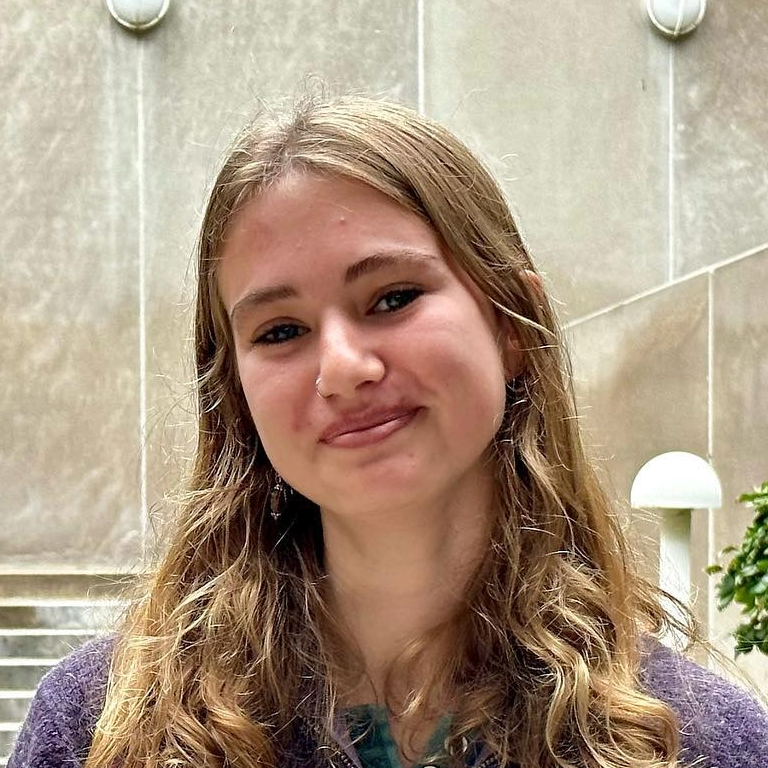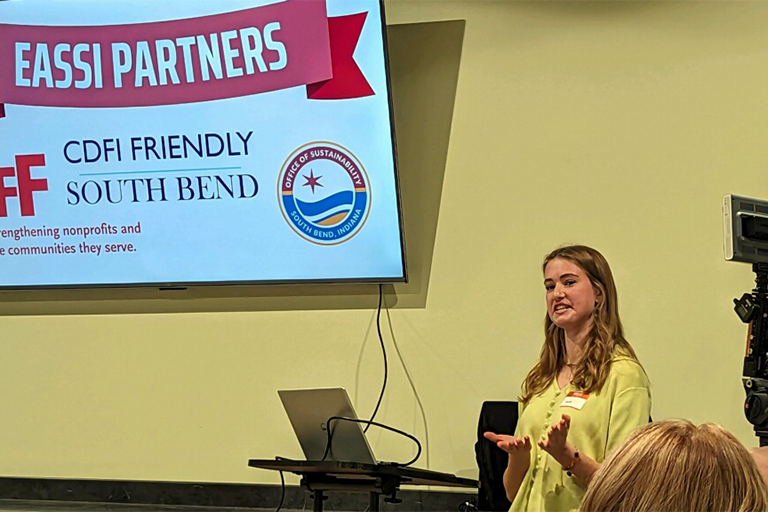This Q&A series highlights McKinney Climate Fellows alumni and their professional journeys within Indiana and beyond. The McKinney Climate Fellows program, administered by Indiana University’s Environmental Resilience Institute, connects IU undergraduate and graduate students interested in climate, sustainability, and community resilience with career experiences.
In high school, Chloe Norton wasn’t sure that college was the right choice for her, but when she heard about the sustainability program at Indiana University South Bend, it sounded exactly like something that aligned with her interests.
While at IU South Bend, Norton took advantage of multiple professional development opportunities, including spending her senior year supporting the City of South Bend Office of Sustainability as a McKinney Climate Fellow. Today, she applies her expertise in sustainability as a senior manufacturing technician with Honeywell Aerospace, identifying ways to reduce waste, conserve resources, and save on energy costs.
The following interview has been lightly edited for length and clarity.
What were some of the major projects you worked on during your McKinney Climate Fellows placement with the City of South Bend?
The main project I worked on was the Energy Assistance and Solar Savings Initiative (EASSI). This program is meant to help local nonprofits and businesses to incorporate solar or energy efficient appliances into their organization to save money and incorporate sustainability into the city. I worked on a storytelling project where I reached out to the nonprofits that had done the program last year. For this, I did a lot of work with the community and made fliers showing the results of the EASSI program. I visited many of the sites, got their energy and utility data, and talked with them about the program and how it helped them grow. I helped with the video storytelling where we made a mini docuseries explaining and promoting the program. Then in the spring semester I did outreach for new businesses to apply to the program.
What responsibilities do you have in your current role?
I work at Honeywell Aerospace. Honeywell is a massive company, and aerospace is one of their subsectors. The South Bend site that I work at makes airplane wheels and brakes. There's a lot of waste that goes into that process, so I work on sustainability projects. Right now, I’m working on things like waste diversion and mitigation, water management, energy efficiency projects, and remediation projects.
What do you enjoy most working for Honeywell?
I really am enjoying my position. I like that my job is flexible and is a designated sustainability role. I also like that I’m still local to South Bend, and it allows me to make a difference in the place that I grew up. There's such a good sense of community in South Bend, and I’m able to meet so many great people.
What skills did you learn in your fellowship that help you in your job now?
Project management. My supervisor and I had a weekly check-in to go over goals, and it helped me learn how to organize my projects. I also learned a lot about Microsoft Excel. Now I use Excel every day in my current role. I also picked up skills like graphic design. Finally, the McKinney Climate Fellows program helped me get out of my comfort zone. I had to show up to events and talk to people, which I had never really enjoyed doing before. It helped with my networking and public speaking.
What called you to focus on a career in climate and sustainability in Indiana?
I have always loved being in nature and grew up outside as a kid. In high school, I didn’t know what I wanted to do or even if I wanted to go to college. Then one of my old friends mentioned the sustainability program at IU South Bend and it sounded like exactly what I wanted to do. I really don’t see myself doing anything else because sustainability is something I think about and do consciously every single day. I think about how I can influence other people to do different things and what I can do to make a big difference in the long run. I wanted to stay in the South Bend area specifically to be closer to my family. I’m also close to a lot of nature.
You’ve had experiences in multiple environmental sectors, how does this affect your view of sustainability?
I am glad that I have experience in a lot of different sectors. You need to learn a bit from each sector. For example, there are things that working at a land trust taught me that working for the city or a corporation did not and vice versa. I’ve been able to piece together multiple perspectives. Further, working outside and with nature gave me more passion and has driven my motivation in my current role. I feel more confident in myself. Learning to be flexible and adaptive to different roles, while not losing sight of the knowledge I already have, has served me well. I knew that if I wanted to be in the corporate space then I wanted to actually make a difference and push for what I know is right.
Looking forward, what do you think young professionals interested in climate careers should know as they enter the workforce?
It’s going to be hard and difficult, especially if you’re working for a company where sustainability is not their main priority. It gets frustrating at times, and you may need to compromise on certain things. For example, something may seem like a straightforward action to you, but from their standpoint it may not make financial sense. I've also worked with companies whose main focus is environmental work and restoration. I’ve had amazing experiences with them as well.
About the Environmental Resilience Institute
Indiana University’s Environmental Resilience Institute connects a broad coalition of government, business, nonprofit, and community leaders to help Indiana and the Midwest better prepare for the challenges of environmental change. Together, we integrate research, education, and community to create environmental resilience and climate solutions—building a more sustainable, equitable, and prosperous future. Learn more at eri.iu.edu.




